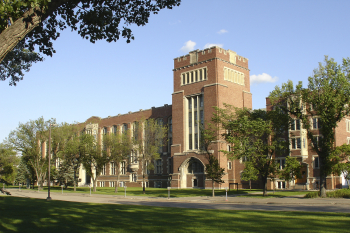So when you get together a whole bunch of well meaning evangelists together to talk about church growth, how to get people in the doors, it all ends up collapsing pretty quickly because you have two things going on at the exact same time.
Thing 1 - You are getting information and ideas from people who are already in the church, and
Thing 2 - You're getting zero input from the people you're trying to reach, because they're as of yet unreached. And you're not likely to get information from them until they're already in the door and have signed on.
So what to do? It's a really good, really important question that can't be overstated. You can't get input from people unless they tell you, and the only feedback you'll ever get is that you guessed wrong.
Now, we who are in the church, who want to share the message of meaning, of dignity, of purpose and of salvation that Jesus Christ brings, it's complicated to bring that to people whom we don't know, and who aren't giving us any clues. And in that case, how on earth are we supposed to figure out what they need? How on earth are we supposed to work out what it is that the kids of today are into, given that they're not telling us, and they just roll their eyes when we talk?
Well, fortunately enough, we have been given a great gift in the scriptures, something that we don't often talk about, and really only in this period following Easter, and that is the book of the Acts of the Apostles. The book of Acts tells you what the disciples were doing, and what they were doing to attract people to faith in Christ worked. The book of Acts, chapter two tells us that
All the believers devoted themselves to the apostles' teaching, and to fellowship
and to sharing in meals (including the Lord's Supper) and to prayer.
Okay, that seems a little simplistic, doesn't it? Meet together, share meals, share the Lord's Supper, dedicate yourselves to the apostles' teaching and figure it out from there. Simple enough. Prayer, worship together, fellowship. That's too simple. What about a ten step program for teens? What about a fifteen point evangelism program? What about any of these things?
I'll be the first to admit that I don't know much about "church growth," but what I do know is that the book of Acts tells us how the early church operated, and they seemed to grow okay. And if they grew okay in those days, without easy communication, with the church being under fire and threatened with calamity at any second, if that's the case there, then who am I to disagree?
It comes down to a tale of two things, classic vs modern. Look at these two buildings for a second.
These are both buildings from the University of Regina, one classic, the other contemporary. But the problem with contemporary, is that it is dated. And it is dated instantly. Because things that are contemporary are by nature of a time, then usually, as far as buildings go, by the time they're finished being built, they're out of style. It's inescapable, which is why so many modern buildings end up looking far more out of date than far older buildings that may be surrounding them. Not because those older buildings are more timely, quite the opposite. They exist out of time, and external to pressures of change in fashion. Again, take these two cars.
Consider the walk on the road to Emmaus. Consider the stroll that those two disciples were making when they encountered their risen Lord. He greeted them, they responded. He asked them what was on their minds, and they told him all their disappointments, all the reasons that sadness was etched on their faces. They told him everything they had expected, and their frustration that it hadn't worked out the way they had planned. Jesus was supposed to save them from everything temporal, and instead he had gotten himself nailed to a cross and killed. So much for their liberation from worldly problems. And then as they walk, Jesus goes ahead and explains everything from the scriptures concerning himself. And the scriptures are long, you know because you've given up trying to read them all the way through a few times, right? The scriptures are long, and they are laced through, filled to the brim with references, stories, allusions and signs of Christ our Lord. The Bible is about him, and everything in it points to him. And after Jesus has explained to them everything from the scriptures concerning himself, then they invite him in for a meal, and he takes bread, blesses it, and breaks it with them, and they at that moment recognize him, and he is real before them. Then he vanishes from their sight, and they carry the joy of having encountered him with them, and communicate it to others when they see them.
You know what that is? It's the liturgy.
Think about that walk to Emmaus, and how closely it mirrors the liturgy in churches. They meet up with Christ, tell him what it is that has given them sorrow, why they feel as though Christ has not lived up to his promises to them. They tell Jesus why they are sad, angry, hurt, disappointed. And then Jesus tells them about himself in the scriptures. He explains to them everything in the Bible about himself, from the Old Testament to the New, he tells them that the scriptures are all about him. And then, he takes the bread, breaks it with them, and is suddenly recognized by them as their Lord. And that is exactly what the church service offers. What do we have to offer people in our churches? We have Christ to offer them, the word made flesh. We have the real presence of Christ here among us, and if the idea of the walk on the road to Emmaus leading to encountering the risen Lord is something that you think you'd enjoy, then prepare to face the fact that that's exactly what happens every single week.
Every week we encounter the risen Lord. Every week when the words of institution are spoken, and the bread is broken, Jesus Christ is literally every bit as present there in that meal as he was on the road to Emmaus. That's every week. Every liturgy, every Holy Communion, every time we meet together and break bread, Christ is present.
So when we're thinking about church growth, it's always good to consider and to ponder through the fact that the Holy Scriptures already told us how to get it done, and in both cases, it involves breaking bread. Breaking bread in fellowship, and breaking bread at the Lord's table. And in both those cases, those are places that Jesus promised to be, and to be found. So when you're thinking about church growth, and thinking about what it is that people are looking for, it's a good chance they're looking for Christ. The big secret that we have in our churches is that we know where to find him. He is found in the breaking of the bread.






Thank you for the inspiration!
ReplyDelete